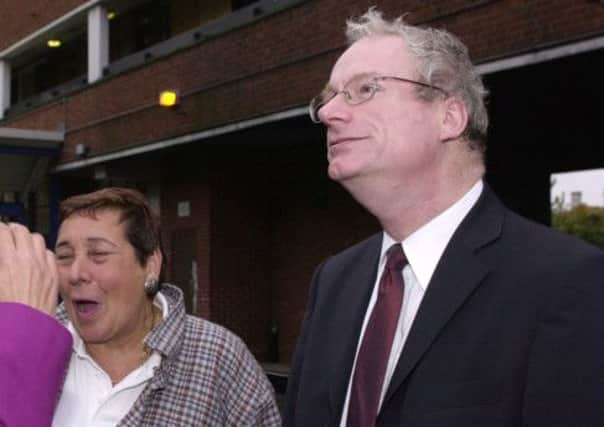Chris Smith: My heart and head say ‘no’


I FELL in love with Scotland when I was ten years old and we moved to Edinburgh. I grew to adulthood roaming the streets and squares and hills of the city, climbing Arthur’s Seat at midnight, singing Flower of Scotland (I still do), listening to the Corries and Gaberlunzie, reading the poetry of Hugh MacDiarmid and the novels of Neil Gunn and Lewis Grassic Gibbon, and feeling fiercely proud of my adopted nation. I still feel that pride.
Advertisement
Hide AdAdvertisement
Hide AdI discovered the hills and glens of the Highlands, too. I would plead to borrow my parents’ car, and head off with friends to bag Munros and walk through featureless bogs in the rain and stand on fine ridges and see eagles soaring, and I knew that this country was the finest place on earth.
It’s why I now live for part of the year on the north-west coast, where the moon shines glistening across the loch and the mountains are etched against the sky.
And that’s why I grieve that too much of the debate about the independence referendum has been cast as a “head” versus “heart” choice. There’s something to that distinction, of course.
This is a vitally important decision – it’s forever, there’s no going back, and it’s very important that everyone makes a considered intellectual, economic, forensic judgment when they vote.
The “head” arguments lead me inexorably towards the Better Together camp, with enhanced devolution subsequently. But the “heart” arguments take me in the same direction.
Scotland’s cultural and intellectual strength has frequently been at its fullest when it has reached out beyond the borders of its own country.
The debate about the “Scottishness” of artistic creativity reached its most acute form, of course, in the stand-off between MacDiarmid and Edwin Muir. MacDiarmid argued that to be a poet or a writer in 20th-century Scotland meant you had to write in Scots and focus on Scotland alone. Muir thought it only possible to write powerfully by embracing the English language and tradition. MacDiarmid famously commented that, having started out as a man after Muir’s heart, he had become a man after his blood.
Both were wrong. Scottish literature and culture can have their own richness derived from a very distinctive Scottish tradition and engagement with the Scottish landscape, history and people.
Advertisement
Hide AdAdvertisement
Hide AdBut they can also have a richness derived from interaction with other streams of thought and culture, be they European, American or – especially – English. There’s no “should” about either of these two streams. But when they join they can be incalculably powerful.
There’s a famous passage in Grassic Gibbon’s Sunset Song, where Chris Guthrie, the heroine, speaks of how “two Chrisses there were that fought for her heart and tormented her” – the Scottish Chris and the English Chris. I know exactly what she meant. But I believe passionately that the Scottish inheritance that I have drawn on throughout my life – the songs of the mountains and the glens, the sweeping romance of Scottish history and thought – has fused wonderfully with an English cultural life that I have relished, learned from, and perhaps occasionally contributed to. There should be no either/or in reaching for an understanding of Scottish identity.
There can be, if we want it, the best of both. The drive for political independence seems to me to be heading in quite the opposite direction.
Scots have contributed so much to the world’s knowledge and thought. Where would the Enlightenment have been, without the genius of the Edinburgh giants of the 18th century?
Where would the world’s engineering and electronics and medical science and (even) banking have been without the Scots?
Where would British democratic socialism have been, without its Scottish as well as its English founders? And where would contemporary literature have been without the Scottish renaissance?
But equally, the world’s knowledge and thought – and as a special element of that, English knowledge and thought – have contributed so much to Scotland and Scots. From Shakespeare to the welfare state and the NHS (brought into being by a Welshman, of course), from the paintings of Turner to the founders of the Edinburgh Festival, this is profoundly true.
Surely, in an increasingly globalised world, we have learned that we cannot and should not isolate ourselves from other influences and engagement? Surely we can recognise the strength of sharing, and joining, and combining cultural influences, and doing things together.
Advertisement
Hide AdAdvertisement
Hide AdMy great political mentor and friend was the late John Smith. I climbed hills with him, I had a dram or two, I learned much from him about political vision, pragmatism and integrity.
I know for certain how clearly he would have seen this fundamental point. Scotland as a proud, historic, distinctive, progressive entity, yes. But Scotland as a part of a broader cultural, intellectual and political whole as well.
Hugh MacDiarmid wrote once that “The rose of all the world is not for me”. For all his internationalism, he did himself and Scotland a disservice with that phrase. The rose of all the world is for me, and for Scotland. That’s why, in the end, remaining united is so important.
• Chris Smith, Baron Smith of Finsbury, was a Labour cabinet minister from 1997 to 2001
SEE ALSO